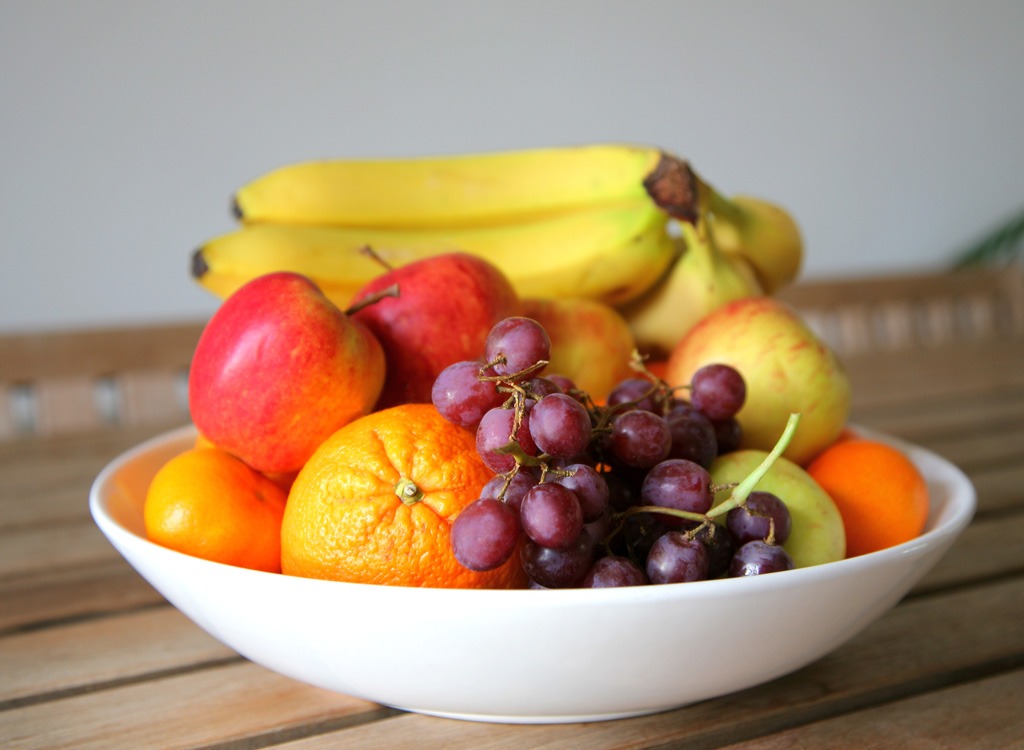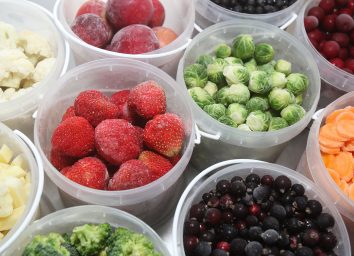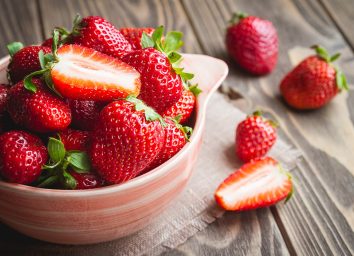What Happens to Your Body When You Eat Fruit

What’s not to love about fruit? It’s basically nature’s candy—providing the perfect topper for your breakfast cereal, a convenient snack when you’re on the run, and a healthy dessert you can feel good about eating. Whether you enjoy some sliced banana with your overnight oats or some berries in your Greek yogurt, you may be wondering how your habits affect your health—and what happens to your body when you eat fruit is actually pretty amazing. As they say, an apple a day keeps the doctor away, and there are definitely are a ton of perks to eating these foods. However, experts say the key to reaping the benefits without any negative effects is heeding the old mantra “everything in moderation.”
“In the short term, when we eat fruit, we immediately ingest dietary fiber, vitamins, minerals, water, electrolytes, phytochemicals and antioxidants,” says Brooke Glazer, RDN, nutrition consultant for RSP Nutrition. “Long term, sufficient intake of fruits is linked to a reduced risk of chronic diseases like heart disease, high blood pressure and high cholesterol. Eating fruit is also associated with weight management and a reduced risk of obesity.”
Pretty impressive, right? But that’s not all that eating fruit does to your body. Here’s what you need to know.
Your blood sugar will increase.

According to certified nutritionist Paul Claybrook (MS, MBA, CN), fruit can raise your insulin levels because as you digest the carbohydrates it contains, your blood sugar naturally increases.
“Don’t worry, this is not a bad thing,” says Claybrook. “Most fruits have at least a moderate glycemic index, which ultimately means that it’s a more gradual increase in blood sugar followed by a steady decrease—the way it’s supposed to be.”
This is because the sugar found in fruit isn’t the same you’d find in a donut or a soda, which is absorbed almost instantly. Claybrook explains that the chains of sugar in fruit have to be broken down by your digestive system before they can enter your bloodstream, which takes some time, thus preventing a sudden spike.
However, that’s assuming you eat a moderate amount of fruit. The ideal amount of fruit to consume depends on your age, gender, and level of physical activity—but Glazer recommends aiming for about two to three servings of whole fruit per day. If you overdo it in one sitting, Claybrook says that could cause your blood sugar to go up too much.
“When you consume a lot of fruit, you are getting a constant flow of lots of sugar rather than a constant flow of some sugar like you would with a normal serving size,” he explains. “As a single event, this isn’t much of an issue but binging on fruit frequently could be a problem.”
You may get (temporarily) bloated.

Don’t be alarmed if you feel slightly bloated immediately after eating fruit. While this is one of the more unpleasant side effects, experts say it’s pretty common.
Vive Nutrition founder Andres Ayesta (MS, RD, LD, CSCS, CSSD) notes that you’re more likely to experience bloating and indigestion when you eat fruit in excess—which is why he emphasizes that moderation is key. However, you may still notice some mild bloating even after eating a normal portion size.
“This is due to fruit’s high fiber content and can also cause bloating for individuals who have difficulty breaking down a particular fruit,” explains Glazer. “But remember, bloating does not equal weight gain and eating whole fruit is not associated with weight gain.”
You’ll get a hefty dose of antioxidants.

By now, you’ve probably heard of antioxidants—these substances have long been hailed for their cancer-fighting, anti-aging benefits. Well, many fruits are chock full of them. In particular, Ayesta says citrus fruits are high in vitamin c, mangoes are packed with beta carotene, watermelon is loaded with lycopene, and berries and apples boast lots of other important antioxidants.
“Antioxidants act as scavengers in the body to clean up free radicals,” explains Glazer. “Free radicals (are molecules that) cause damage and lead to disease development and advanced aging. So, eating colorful fruits that are rich in antioxidants keep us healthy and young.”
Claybrook adds that antioxidants also both boost your immune system as well as decrease inflammation.
“They help the immune system by eliminating a lot of free radicals that the immune system would normally have to deal with,” he explains. “Your immune system can only do so many things at once and if it can’t keep up with all the free radicals and some end up reacting with, say DNA, you could end up with cancer.”
Since each type of antioxidant has different health benefits, Glazer recommends switching up what kinds of fruit you’re eating on the daily.
You’ll probably feel full.

While fruit only really has trace amounts of protein, it can still be surprisingly satiating. According to experts, this is because it’s high in both water and fiber.
“Fiber creates ‘bulk’ and thus slows down the digestion of any food,” says Claybrook. “When fiber sucks up water, it gets much bigger and once your stomach stretches enough, you feel full.”
Ayesta adds that both the fiber and water content contribute to a lot of volume in your stomach, thus giving you the feeling of fullness without providing a ton of calories.
“A cup of pineapple contains roughly 80 calories and can be a satiating snack or ‘dessert’ after a meal making you feel satisfied while also providing hydration, fiber, and vitamins and minerals.”
You’ll get hydrated.

Did you know that an apple is 85% water? Or that strawberries are made up of approximately 92% water? Since fruits are rich in water content, they can definitely aid in hydration — especially varieties like melon and pineapple, according to Ayesta.
“While you usually eat fruit, you are actually getting far more water than anything else,” says Claybrook.
That makes fruit an ideal post-workout snack or quick pick-me-up on a sweltering summer’s day.
You’ll help your body perform basic functions.

Your body relies on certain vitamins and minerals to function properly—and fortunately, fruit is loaded with lots of essential nutrients.
“Fruit provides a variety of vitamins and minerals that aid the body in hundreds of metabolic processes,” explains Ayesta. “For example, the potassium in bananas aid in nerve signals, muscle contraction, and fluid balance.”
The bottom line? Eating fruit helps your body to work more efficiently.
For my healthy eating tips, be sure to sign up for our newsletter.








